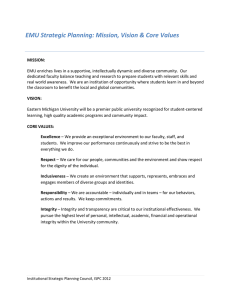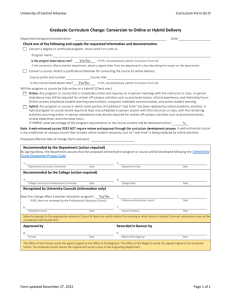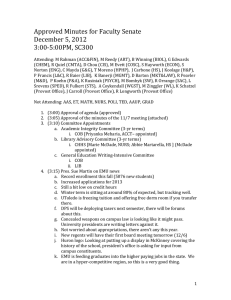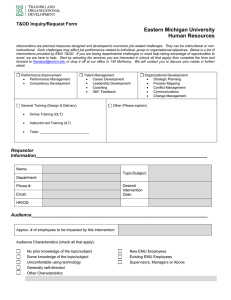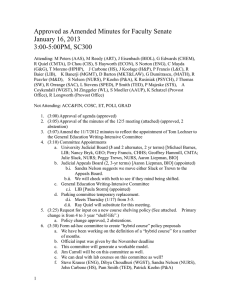Approved Minutes for Faculty Senate November 7, 2012 3:00-5:00PM, SC310A
advertisement
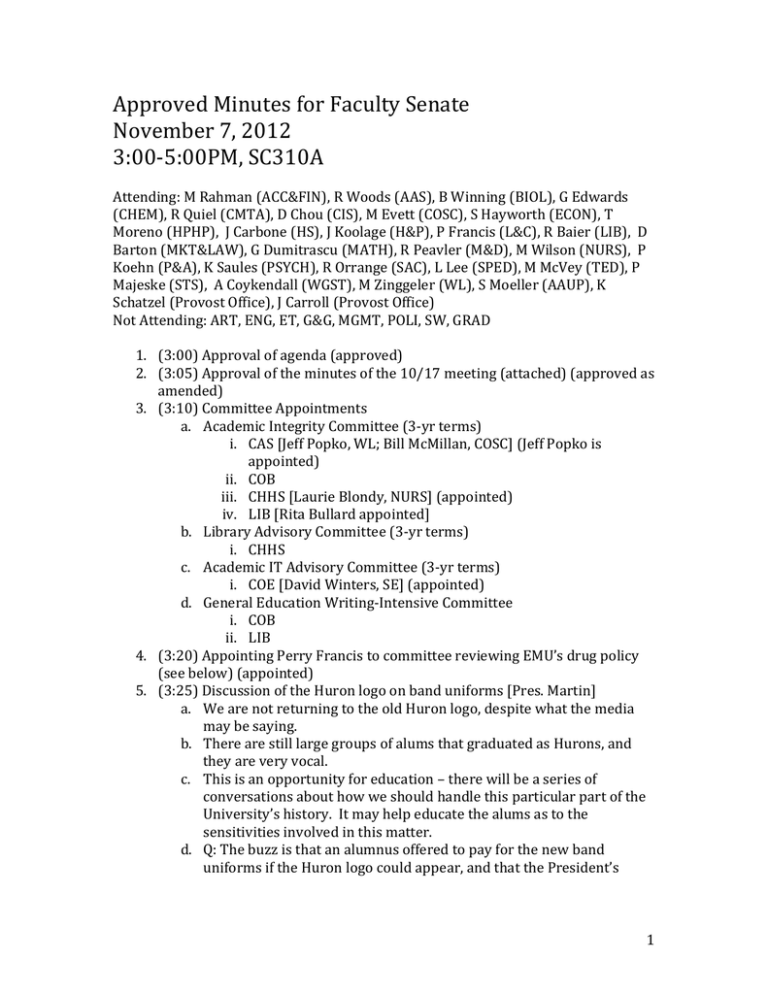
Approved Minutes for Faculty Senate November 7, 2012 3:00-5:00PM, SC310A Attending: M Rahman (ACC&FIN), R Woods (AAS), B Winning (BIOL), G Edwards (CHEM), R Quiel (CMTA), D Chou (CIS), M Evett (COSC), S Hayworth (ECON), T Moreno (HPHP), J Carbone (HS), J Koolage (H&P), P Francis (L&C), R Baier (LIB), D Barton (MKT&LAW), G Dumitrascu (MATH), R Peavler (M&D), M Wilson (NURS), P Koehn (P&A), K Saules (PSYCH), R Orrange (SAC), L Lee (SPED), M McVey (TED), P Majeske (STS), A Coykendall (WGST), M Zinggeler (WL), S Moeller (AAUP), K Schatzel (Provost Office), J Carroll (Provost Office) Not Attending: ART, ENG, ET, G&G, MGMT, POLI, SW, GRAD 1. (3:00) Approval of agenda (approved) 2. (3:05) Approval of the minutes of the 10/17 meeting (attached) (approved as amended) 3. (3:10) Committee Appointments a. Academic Integrity Committee (3-yr terms) i. CAS [Jeff Popko, WL; Bill McMillan, COSC] (Jeff Popko is appointed) ii. COB iii. CHHS [Laurie Blondy, NURS] (appointed) iv. LIB [Rita Bullard appointed] b. Library Advisory Committee (3-yr terms) i. CHHS c. Academic IT Advisory Committee (3-yr terms) i. COE [David Winters, SE] (appointed) d. General Education Writing-Intensive Committee i. COB ii. LIB 4. (3:20) Appointing Perry Francis to committee reviewing EMU’s drug policy (see below) (appointed) 5. (3:25) Discussion of the Huron logo on band uniforms [Pres. Martin] a. We are not returning to the old Huron logo, despite what the media may be saying. b. There are still large groups of alums that graduated as Hurons, and they are very vocal. c. This is an opportunity for education – there will be a series of conversations about how we should handle this particular part of the University’s history. It may help educate the alums as to the sensitivities involved in this matter. d. Q: The buzz is that an alumnus offered to pay for the new band uniforms if the Huron logo could appear, and that the President’s 1 office approved it. Is this accurate? A: Yes, the President’s office did approve the use of the logo, but there was no mystery donor. e. Comment: At some point we may have a historical display of the University’s logo, so we will need some way to deal with this. We must acknowledge (tastefully) our history. f. Q: Have you considered having a press release describing how this happened? It seems like without it, we may appear to be hiding something. A: There has been some outreach, but we could use advice on handling this and perhaps making some sort of official statement. g. Q: Would you welcome additional people on the committee? A: Yes. 6. (3:35) Requested input: defining “online” courses (see below) a. Provost office is asking for input concerning the definition of “online,” “hybrid,” and traditional classes b. Creating a policy that covers this allows flexibility for authorizing new pedagogical techniques when teaching in non-traditional formats. c. A number of Universities have definitions of these types of courses. d. The goal of this is to be able to inform the students of what they can expect when they enroll in a hybrid class. e. ¾ of hybrid courses are being scheduled as traditional courses. f. 26 courses fall into an “irregular” pattern, that meet less than the prescribed time for traditional classes. g. “First week” and “last week” requirements are for information (first week) and course evaluation (last week). h. Wants senators to take this information back to their departments for input. i. Course meetings will be entered in Banner so that the students can plan. j. Putting this into the contract will result in a large number of MOUs for exceptions. k. Comment: The requirements listed are not sufficient to provide a structure. l. Comment: 50/50 is too much, might want to reconsider that number, and it may be better to specify the “last two weeks” as a better way to get evaluations. m. Comment: Prior attempts at definition went on for months, and probably still exist. Is it still true that outside assignments can take the place of an in-course session? (Yes, though it was not considered when putting the data together). Also, departments will have different needs when it comes to hybrid courses, so the 50/50 number may be too rigid. n. Comment: This definition of “hybrid” is too rigid. Also, due to last minute schedule changes, an instructor may end up teaching a course in a format that they do not wish to use. o. Comment: Could say that when enrolling in a hybrid class, the student should check the schedule of meetings, rather than actually specifying 2 a fraction. There could be a range of contact hours that are used to define hybrid courses. 7. (3:45) Provost Office’s Q&A a. MOU regarding the EAA i. Original agreement created the committee and that the BoR can name the Chancellor. The provost’s office has not moved forward with this until recently. Discussions have begun about EMU’s role in the EAA. The Provost meets with the Chancellor on 11/12/2012. ii. Q: Is it just the Provost and the Chancellor meeting? Not the Dean? A: Not yet. b. Lecturer’s office in King Hall i. We are waiting for an asbestos abatement to be completed before we start moving lecturers in. c. Q: We have heard that there is an 11/16 deadline for registration, after which under-enrolled courses would be cancelled? A: That may be something an individual college may be doing, but not the University as a whole. d. There is a financial reward for registering early (and early bill dates have been changed so that students don’t have to pay for their classes until the semester starts.) 8. (3:55) Presentation on Physical Plant [John Donegan] a. Many small projects (repairs, etc) have been taking place. b. There is a 3-year capital plan that we will use as a roadmap. Spending levels are decreasing. c. Q: One of the problems we have seen is the crossover from the library to the parking lots (West Circle Drive) – it can be difficult to cross this street, especially if one is handicapped. We have heard that there is a traffic engineer coming in to look at these issues. Is this true? A: No. d. The codes have changed with regard to parking lots – the number of ADA parking spots has increased, etc. e. Comment: it is not uncommon for there to be more than 200 feet from the parking spots and the intended destination buildings. f. Q: The third floor of Alexander still has a hole in it – when will it be repaired? A: Fixing the roof (and a number of other issues) are part of the capital plan. The east side of campus will be getting more attention. g. Comment: We do a lot of recruitment in Alexander, and the place is a blight. Resp: Physical plant will look into this and see what they can do. h. McKinney Hall and King: i. We received a $600K insurance adjustment after the flood McKinney had a couple of years ago. This will pay for improvements for the stairwells and fire protection, and sound dampening in the main ballroom. There may be enough left over to open an area for historical displays. 3 ii. Moving people into King Hall went very quickly. King was mostly swing space, but once offices were moved back to Mark Jefferson, there has been a lot of calls for office space. The building is underpowered, has minimal AC, etc. The renovation process will start slowly, perhaps floor by floor. This is scheduled for year three of the capital plan. i. Q: We are really lacking in bike racks. Are there plans to address this? A: This is a high priority, and we will look at this issue comprehensively – just adding more racks is not sufficient. It would be great to have dedicated bike paths through campus as well. j. Crossing Oakwood at Washtenaw is really dangerous. Resp: The city has jurisdiction over that intersection, it is definitely a problem. 9. (4:15) Discussion of Strategic Planning (see below, and attached) a. There was a lot of discussion of the Initiatives list. This list is a collection of comments and ideas from workshops and surveys. b. Looking for comments about the Mission, Vision and Values list. i. The mission statement is incorrect as long as the foreign language requirement is dropped. ii. Q: Under Values, it seems to imply that only students learn and do research. It would be nice to have mention faculty. c. Initiatives: i. Comment: Seems like we are cutting ourselves out of STEM – we should not do this. ii. Comment: What does it mean that we don’t have a plan for online programs? (We approach online courses haphazardly.) iii. Comment: We need to really enhance our General Education programs so that our students have good critical thinking skills. iv. Comment: Can we move to a more evidence-driven initiatives rather than just a list. We should be asking students why they came here, why they stayed, why they left. v. Matt would like us to share these documents with the departments for input. He’d like the feedback “soon” (perhaps before Thanksgiving?) Matt will send the lists out to the faculty. vi. Q: What kind of feedback? A: Are there things on this list that we particularly like or dislike? 10. (4:40) Committee Reports a. Report on Faculty Affairs Committee meeting [Matt Evett] i. Matt spoke at the general Board meeting, and brought up the Huron logo issue. The other two speakers addressed the same issue. b. EEFC [Patrick Koehn] i. Thin client solutions for computer lab refresh are a possibility ii. Classroom technology refresh on a 7 year cycle. c. Univ. Budget Comm. [Mahmud Rahman] 4 i. Looking at differential fees so that students that don’t take high-consumable courses don’t pay the same fees. d. eFellows/FDC [Randy Baier] i. Having another eFellows meeting to restructure the application. January 11th will be the deadline for the next call. e. Intercollegiate Athletics Advisory Committee i. The IAAC is looking to change its bylaws, to expand faculty involvement in the committee’s activities and maintain continuity within the committee. The number of faculty reps will be increased to 7, and the committee will elect a co-chair from the Faculty Senate reps. ii. We will vote in December about changing these bylaws. f. Parking i. 9/20 meeting: Revenue comes from tags, citations and guest lots. This revenue is used to repair lots, etc. ii. Shuttle bus to Rynearson is not handicap accessible. iii. Stripe and seal 1/3 of the lots per year. iv. Trying to redo the parking at Rynearson, will be performed in stages. v. Were told that a traffic engineer would be coming to campus, but Physical Plant hasn’t heard of it. vi. The model is a bit dysfunctional. Every effort to ease problems will reduce revenue. g. IT Steering i. We should be using the EMU Wireless-Secure network. ii. Matt would like to know how the 4-year computer refresh cycle is working for us. (Short answer, it’s not.) 11. (4:55) President’s Remarks a. The next Senate meeting is Dec. 5, SC300. Next Executive Board meeting is Nov. 28, SC320 b. Provost has requested a special budget committee that reports to her. 5 Committee Appointments Academic Integrity Committee CAS Bill McMillan, COSC: I was on the AIC starting in 2005 or 2006 as a DH representative. I participated in planning for and discussion about IRB and ethics training for researchers and was one of two members who heard a plagiarism case a couple summers ago. My tenure on the committee coincided with a change or two in leadership and I served with a wide array of faculty members. I might have a bit more "institutional memory" about the work of the committee than some others. Laurie Blondy: Dear Faculty Senate: 11/3/12 I am interested in serving on the Academic Integrity Committee as a representative for CHHS for several reasons: As a dedicated educator, I promote a learning atmosphere of mutual respect. We all learn from each other. As an educator and a parent, I am keenly aware of the importance of setting a good example for those we lead and teach. I believe that as faculty we are in our roles to serve the needs of the students. In my experience, the vast majority of students and faculty work very hard to fulfill their mutual roles successfully. However, given human nature, there are at times disagreements, misunderstandings, and misconduct that occur in the learning environment. When such circumstances occur, it is imperative that there be processes in place to effectively handle them. My life outlook regarding education as discussed above compliments the attributes needed for the role as a committee member. My past legal education and experience have made me all too aware of the necessity of processes that are fair, just, and based on factual data. Additionally, my past experience as the Interim Director of Professional Development & Education at the University of Michigan Health System provided me a lot of hands on experience leading and participating in program and policy development that literally impacted thousands of nurses. Processes and procedures must be well thought out before implementation; they must be fair and timely in application; and they must promote justifiable outcomes for those involved. I believe that my past experience, coupled with my dedication to quality education, fairness and truth make me an ideal candidate for this position. I would like to serve 6 on this committee so that I can contribute to the development and promotion of processes that will foster a healthy learning environment for faculty and students. Thank you for your consideration, Laurie C. Blondy Library Advisory Board CHHS Marie McDade I am a new faculty within the CHHS School of Nursing. I am writing to express interest in serving on the university-wide Library Committee. Because I am a new faculty, I have limited experience serving on committees. However, I am quite passionate about learning and the contribution that a strong library makes on learning and academic success. In addition to being a new faculty at EMU, I am an alum that graduated from EMU with a Bachelor of Science in Nursing. I matriculated to EMU in 2000 and spent countless hours utilizing library services at Halle. I have always been impressed with the full array of services and materials that are available to help students succeed. After graduating from EMU, I matriculated to the University Of Michigan where I completed a Master of Science in Psychiatric Mental Health Nursing and where I am a PhD candidate soon to defend my dissertation. I point this out because I still regularly utilize Halle as a resource for needed books, articles, and databases. I am a current recipient of the federal government’s Substance Abuse and Mental Health Services Administration (SAMHSA) Minority Fellowship Program award, and I recently served on the planning committee for the 2011 SAMHSA’s “Weaving the Tapestry of Health: Improving Behavioral Health in Diverse Populations Through Science and Cultural Sensitivity” conference. I am currently serving on the Curriculum and Instruction Committee within the School of Nursing and would look forward to serving on the university-wide Library Committee as well. Educationally yours, Marie McDade Academic IT Committee David Winters: I am interested in serving on the University's Academic IT Advisory Committee as the COE representative. Effective use of IT technology, tools, and support services enhances both instructional delivery as well as instructional effectiveness of our faculty. I would bring both an educational as well as technological perspective to this 7 committee. Currently, I teach SPGN 481: Instructional and Assistive Technology in Special Education. Besides teaching this course in a computer lab and making full use of the available technology, all of my courses involve use of EMUOnline. Before I came to EMU a few years ago, my role overseeing a clinical program at 59 locations in 15 states often included close work with our organization's IT staff. In this capacity, I oversaw the development of a sophisticated database program and delivered long-distance training to all 59 Center Directors using instructional technology. The IT tools available for our faculty have enhanced our effectiveness. I would be honored to be able to contribute to the continued improvement of IT instructional strategies as a member of the Academic IT Advisory Committee. David C. Winters, Ph.D. Biannual review of EMU’s alcohol and drug policy From Perry Francis, 10/30/2012 Matt, I have been asked by the AOD office to serve as the faculty representative for the biannual review of EMU's Alcohol and Other Drugs policy. This is a federal requirement and requires faculty input. I served on this group two years ago. I ask that I be appointed by the Faculty Senate. Respectfully, Perry Defining on-line classes From Jim Carroll, 10/26/2012 The Provost’s office is requesting input on the following definitions An “in-person class” is a section of a for-credit course delivered 100% in-person (face-to-face). A course section must be identified in the course schedule (using Banner codes) as an in-person class before the students begin enrolling in the class. The dates and times of the in-person class must be identified in the course schedule. An in-person class may use web-based portals to deliver course materials, but these materials should not substitute for in-person sessions. 8 A “hybrid class” is a section of a for-credit course delivered 50% in-person and 50% on-line. A course section must be identified in the course schedule (using Banner codes) as a hybrid class before students begin enrolling in the class. A hybrid class must include an in-person session in the first and last week of the term. The dates and times of all the in-person sessions must be identified in the course schedule. An “on-line class” is a section of a for-credit course delivered 100% on-line. A course section must be identified in the course schedule (using Banner codes) as an on-line class before students begin enrolling in the class. As an exception, an on-line class may have one (1) scheduled in-person class session with students during the semester. If the course has an in-person session scheduled, the date of that session must be identified in the course schedule before students register for the course. Any course may be delivery as in-person classes, hybrid classes, and/or on-line classes. The primary need for these definitions is to clarify the expectations and the differences between in-person, hybrid, and on-line classes for the students, faculty, departments, and the colleges before the students begin registering for the classes. The percentages above are based on a 50 minute in-person session per week during a 15 week semester being equivalent to 1 credit hour. Courses with additional contact hours are expected to follow the same percentages of the course contact hours. Input from Faculty Senate is requested by November 30. Strategic Planning DRAFT (6/7/12) EMU Mission Statement Eastern Michigan University enriches lives in a supportive, intellectually dynamic and diverse community. Our dedicated faculty balance teaching and research to prepare students with relevant skills and real-world awareness. We are an institution of opportunity where students learn in and beyond the classroom to benefit the local and global communities. DRAFT 10/23/12 EMU Vision Statement 9 Eastern Michigan University will be a premier public university in the 21st century. By building high-quality academic programs, expanding domestic and global partnerships, and implementing innovative and student-centered initiatives, we will be recognized for our creative learning opportunities, service and engagements, and economic and social impact. EMU Strategic Planning: Mission, Vision and Values I. Suggested Values A. Teaching and Learning – Teaching and learning are central to everything that we do. We are a community of learners who discover, interpret, apply and transmit knowledge. A scholarly environment that promotes research, discovery, interpretation, application and transmission of knowledge B. Student Success – It is the priority of the institution to ensure the full educational experience, which includes the preparation of student careers, the attainment of degrees and contributing well-rounded and grounded students to the community. C. Excellence –We are committed to an exceptional quality learning environment to our faculty, staff, and students. We believe in “Education First.” D. Human Dignity and Respect –Sound judgment, acceptance and respect for other persons, ideas, cultures, religions, diversity, and inclusiveness are our characteristics. We seek to demonstrate, through all programs, activities and services, an appreciation for human diversity and an atmosphere of mutual respect and support for individual differences. We create an inclusive educational environment that provides exceptional opportunities for all. E. Scholarship and Intellectual Freedom –We promote, encourage and support academic freedom. We provide creative learning experiences through intellectual and cultural exchange. F. Community Engagement – We value community engagement as part of the University’s mission. G. Leadership and Participatory Decision-Making – We create and support a collaborative environment that fosters open communication. H. Integrity – Integrity and transparency are critical to our institutional effectiveness. We support the highest level of personal, intellectual, 10 academic, financial and operational integrity within the University community. 11 BALLOT 1. (3:10) Committee Appointments a. Academic Integrity Committee (3-yr terms) i. CAS [Jeff Popko, WL; Bill McMillan, COSC] ii. COB iii. CHHS [Laurie Blondy, NURS] iv. LIB b. Library Advisory Committee (3-yr terms) i. CHHS c. Academic IT Advisory Committee (3-yr terms) i. COE [David Winters, SE] d. General Education Writing-Intensive Committee i. COB ii. LIB 13
